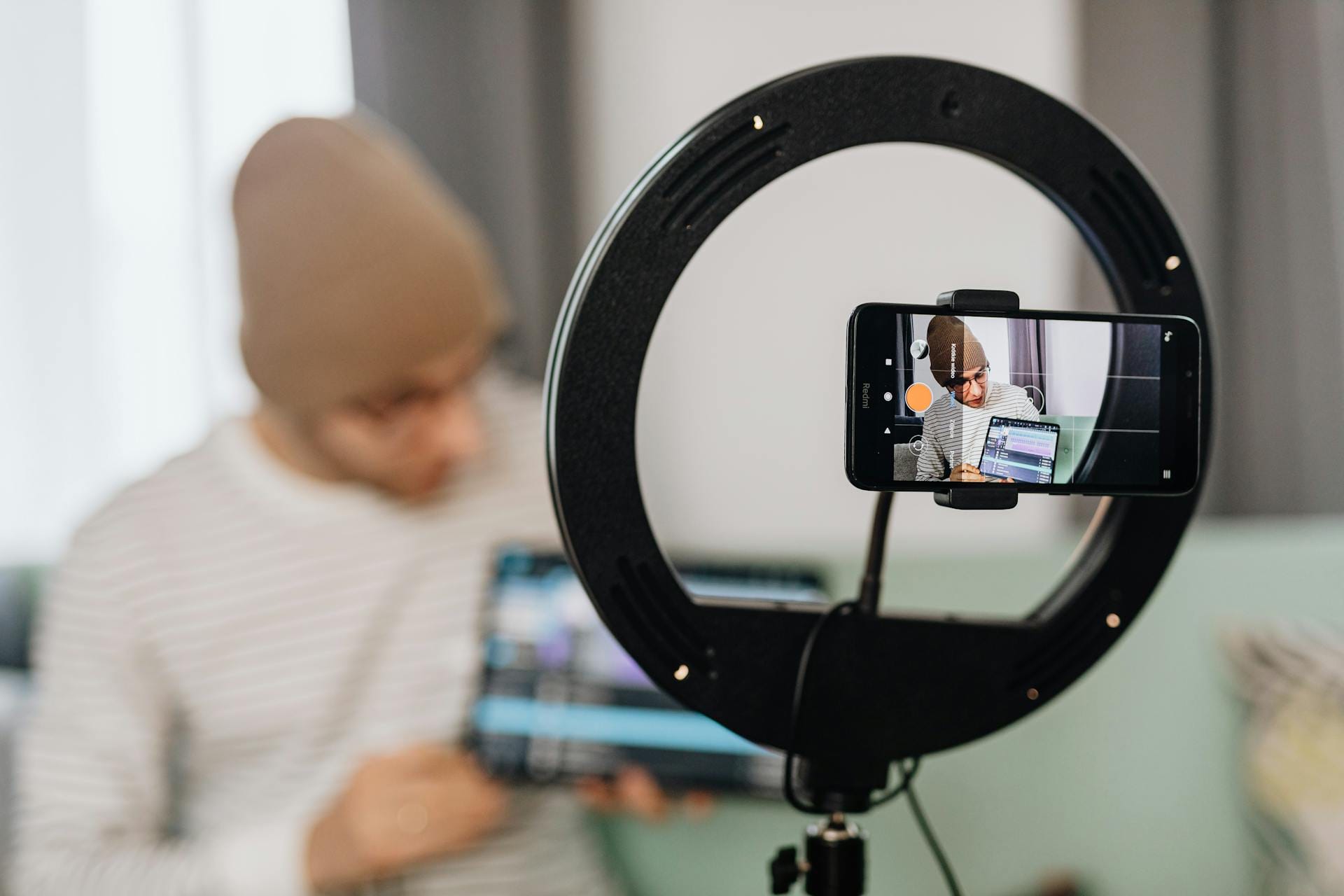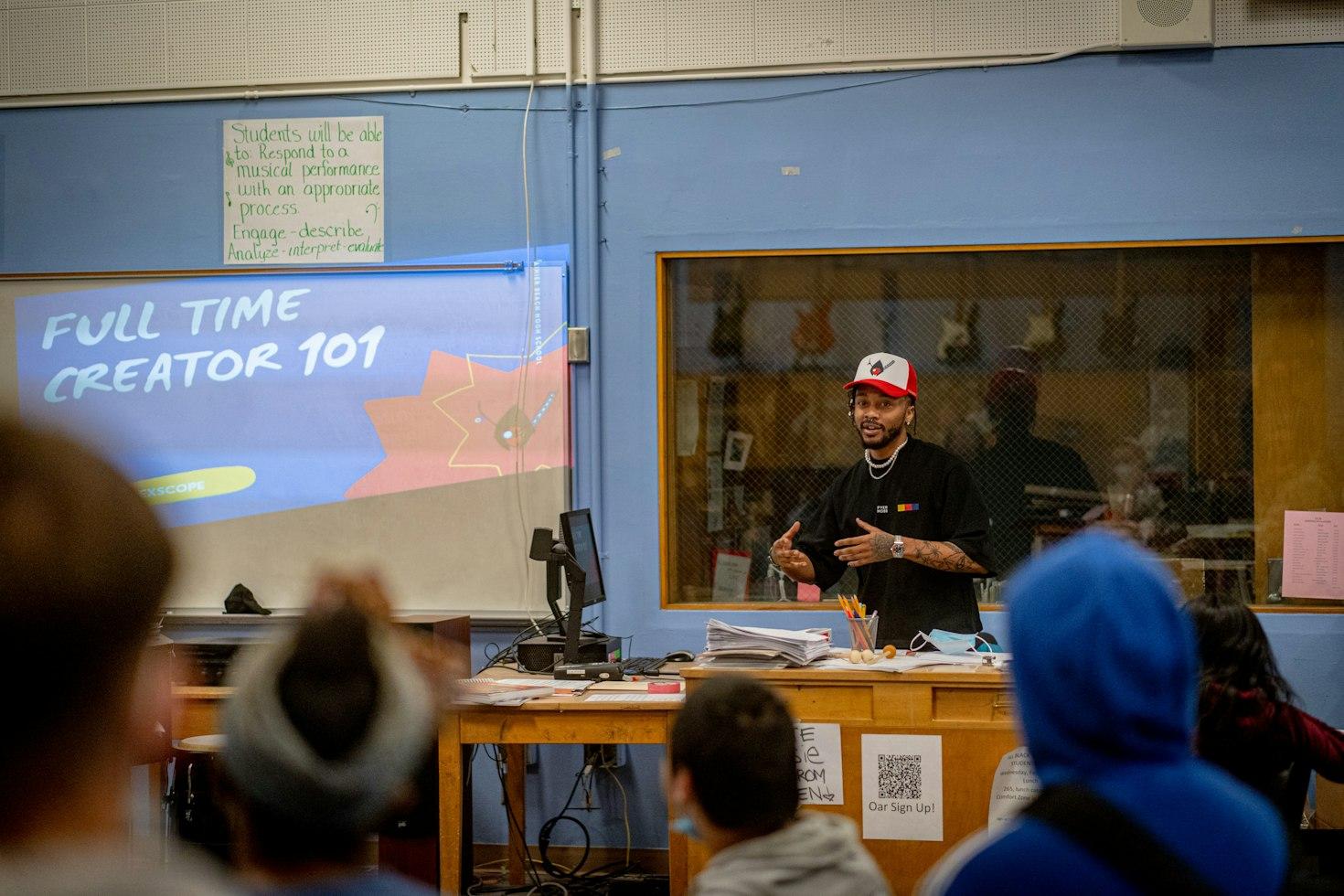
How to use a workshop to validate your business idea
“What if people don’t come to my website? What if I don’t get a paying customer? Ever. What if my business turns out to be a failure?”
I wasted four years before starting a business succumbing to these fears. This is why, in the online business world, most people recommend going through “idea validation” — the process of road testing your idea before you dedicate your working life to it.
So imagine you could get 94 people to tell you face-to-face that they love your idea? Would you say your idea is validated? I’d say it’s a start!

Workshops are a great way to validate your business idea. A workshop is an in-person event where you invite people to learn from you. For example, in my first workshop, I helped students get quick wins in travel hacking, improving their credit history, and finding a job.
In all, the four free workshops I hosted helped me validate my business Beyond Grad in two months. I started Beyond Grad on the side to help ambitious people become Top Performers at work so that they can design the life of their dreams. Since launching three months ago, I have 156 subscribers. And 40 out of the 156 subscribers are workshop attendees: a modest but solid foundation to start growing my company. And better yet, I have clarity on what to do next via conversations I had in person and follow-ups from the workshop.
Like this one:
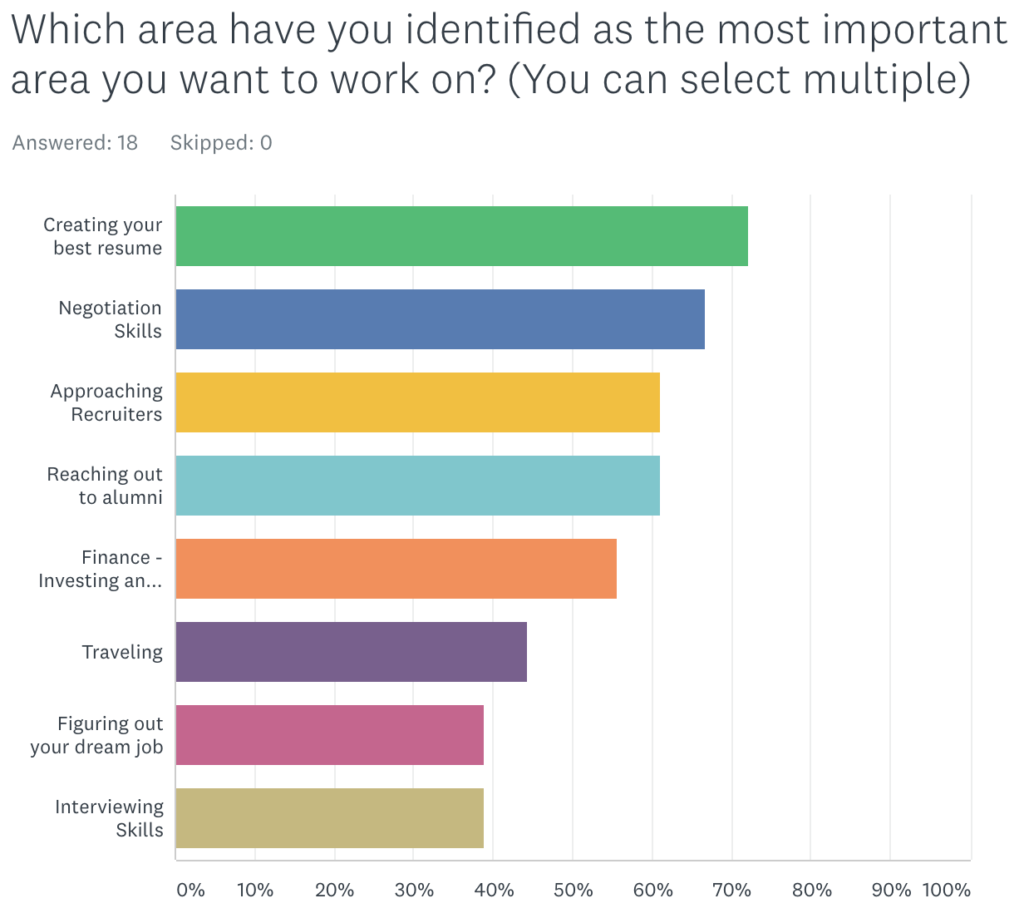
By asking the question, “How much would you be willing to pay for an online course on this topic?” I was able to begin to judge the pay certainty.
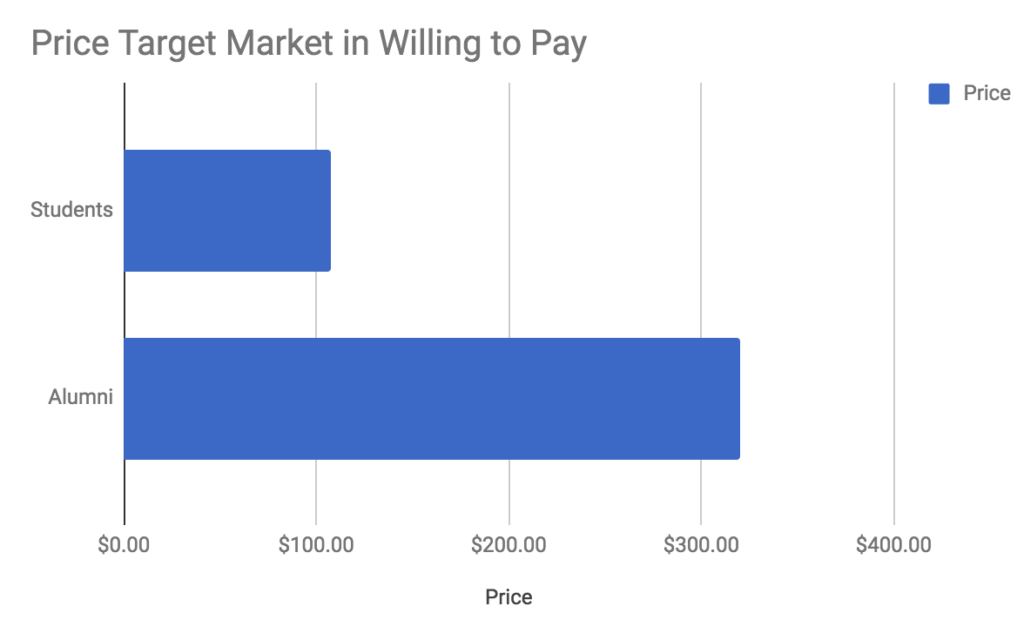
By using the index card technique (explained in this article), I got a ton of qualitative data. Plus, they willingly gave me their email addresses to know more details.
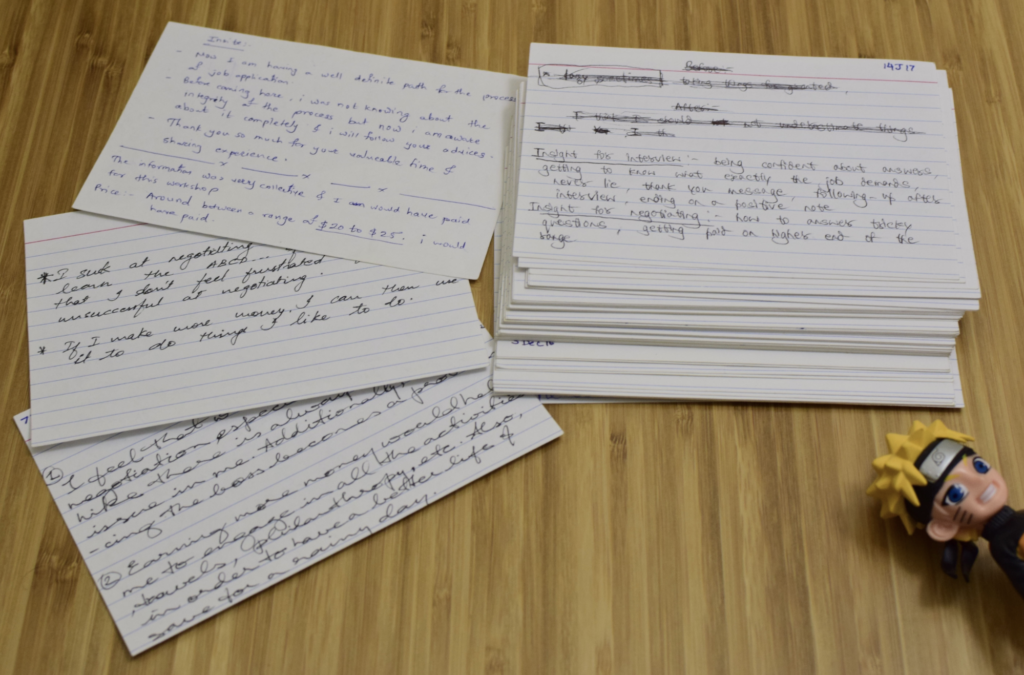
You can launch your online business the same way by using workshops to not only accelerate the validation process, but to launch with high-quality insights.
Here are three steps to go from setting the workshop to validating your business.
Want to build a business that enables you to live YOUR Rich Life? Get my FREE guide on finding your first profitable idea.
Step 1. The Golden Rule: Keep it simple
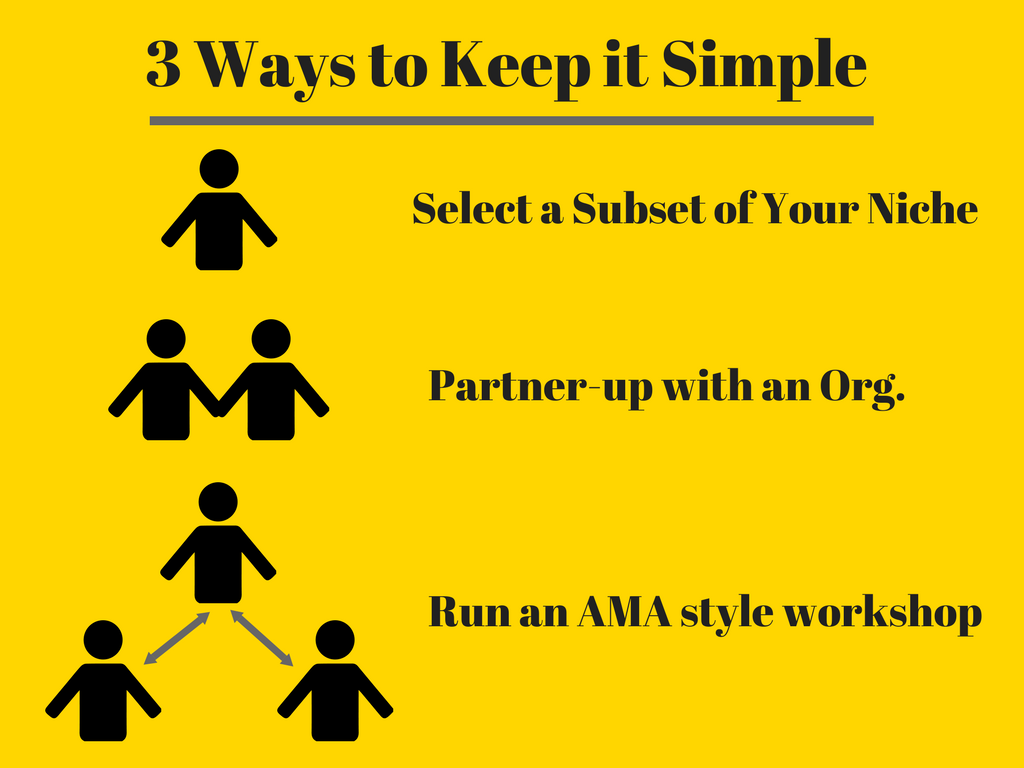
Choose a sub-niche of your audience
My target market is young professionals who want to become Top Performers at work. And for the first workshop, I chose a sub-niche of Indian students who were in the U.S. for their master’s degree at my university (University of Michigan – Dearborn).
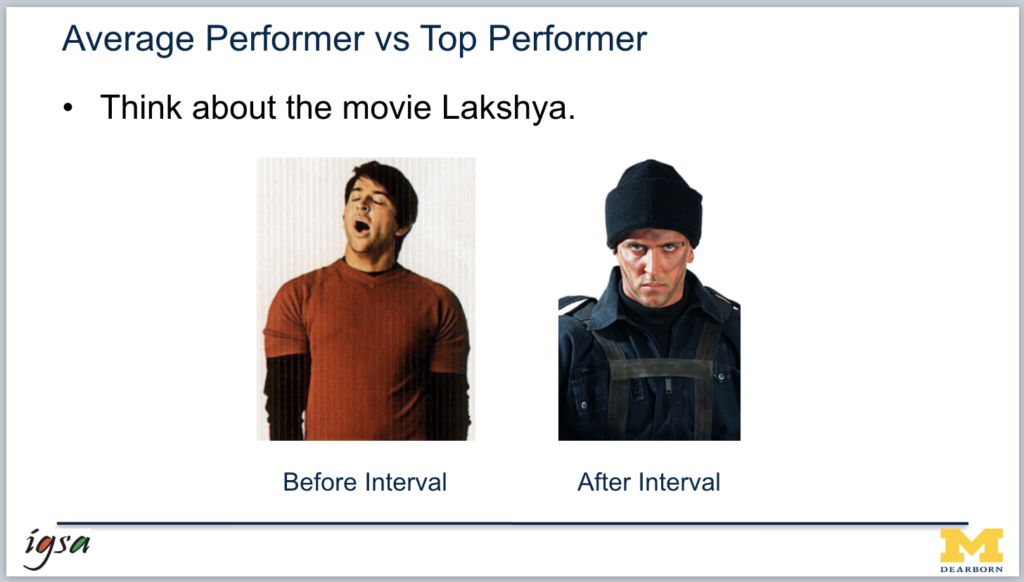
So, for your first workshop, you are choosing an audience:
- That is a subset of your target audience.
- That you are comfortable talking to.
- That is easy for you to find and promote the workshop to.
The reason you choose a small, specific group of people is so that you can speak their language and make the workshop more focused on topics relevant to them.
You are not choosing an audience that you have to be sure is going to be a True Fan. You are experimenting.
Here are some examples of what a sub-niche can look like:
- If your target market is parents who want to teach their kids important values, you can choose parents of the kids who go to the same school as yours.
- If your target market is creatives who want to start an online business, you can choose wedding photographers who have a strong Instagram presence.
Partner up with an existing audience / organization
For my workshop, I partnered up with my school’s Indian Graduate Student Association [IGSA]. It was their mission to help my selected sub-niche.
There are many advantages of partnering with an organization.
- These groups are looking for people to add value to their audience. So you are adding value to them as well.
- You can take their help in designing the topics for your workshop.
- Most of the time, these organizations have meetup spaces that you can use. That way, you don’t have to find (and pay) for a place to host the workshop.
- They have access to your future audience and might promote your workshop via email and social media.
You may already be part of an organization with this sub-niche. Like I was with my university’s student association. Another option is to find local businesses, nonprofit organizations, and community groups that cater to this audience. If you can’t find any offline organizations, you can partner with the admins of groups on social media websites such as Facebook and LinkedIn.
Here is a script you can use to partner up with an organization.
Hello <insert contact name>,
I am <insert your name> and <connection to the organization>.
(Make the connection in the first line to provide quick social proof. You can even link to your LinkedIn or business page.)
Upon researching, I know that your organization has worked with <sub-niche> in X and Y.
(Show that you have researched the group.)
I want to host a free workshop for the <sub-niche> that covers <insert topics>. My intention with the workshop is to add value as <insert one example from personal story>. I would then take the feedback as research for a potential website.
(Be transparent about your goals.)
Would you be willing to set up a 15-minute phone call to discuss how the workshop can best support your mission? I am open to meeting in person at your office as well.
(Your main aim of the email is to get them to say “Yes.” Make them part of the process.)
Design a hybrid AMA event
Ask Me Anything (AMA) events are Q&A-type events run by an expert.
The advantage of an AMA for a seasoned entrepreneur or famous person on Reddit is that they don’t have to prepare material for the event. They use their experience to add value to the audience.
Since you may not be a known expert yet, you can use a mixture of an AMA-style workshop and a presentation. In this format, you talk about a particular topic and spend equal time for Q&A. In other words, a hybrid AMA.
Why should you do this?
- Your goal of the workshop is to validate your idea. A hybrid AMA gives you the best chance to discuss many topics related to your audience in your presentation. It’s like you’re putting out a buffet and seeing which food they like best. Because then you can design your business around these topics.
- By giving an equal amount of time to Q&A, you can use the questions to gauge your audience’s interest.
- One of the challenges of a workshop is to boost audience participation. An AMA gives the audience a chance to converse with you more freely.

Hack (what I did as well): If you have experience in the topics but don’t have a personal system yet, then you can use publicly available material from experts. Give them proper credit and link to their content. You can add to the frameworks by sharing your stories.
After I presented this grab bag of topics, I realized that the engagement of the group was highest when discussing tactical topics such as resume writing and credit history. However, the deepest psychological pain points and dreams were around more challenging topics, such as finding their first job and negotiating their job offer.
Step 2. Play to a full room
When it comes to the workshop, think of yourself as a “low status” person and your audience as higher-status. A low status simply means that you assume your audience is more important and busier than you. So it becomes your duty to organize the conversation and the event.
For my first workshop, I had more experience and knowledge than my audience (because they were students). But it would have been a mistake if I had sat on a high horse and talked down to them. I did all the work to make the event a success, and all they had to do was show up.
Announce the workshop and invite people
You can announce your workshop online or offline. It depends on where your sub-niche hangs out. For example, if you want to target software developers, you want to announce on a forum like Hacker News. If your target audience is gym-goers, then local gyms are the best locations.
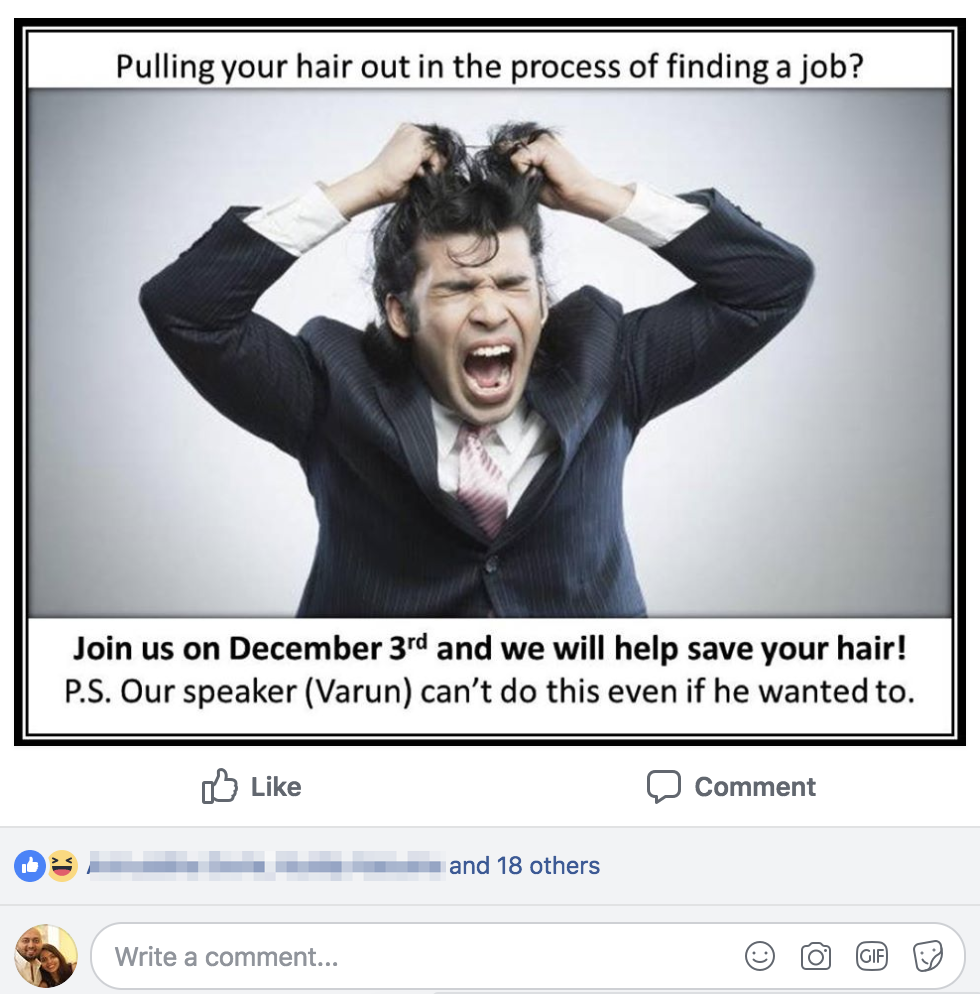
If you are in doubt, then don’t get stuck at this step.
- Select Facebook and announce the event on your page.
- Once you have a few interested people, you can ask them for referrals.
Wish you could connect with more amazing people, and not feel awkward in social situations? Download our FREE Ultimate Guide To Habits below.
If you are partnering up with an organization, then use their marketing platform to launch the event as well.
To invite people and organize the invite list, you need an event hosting website. This is where your audience will sign up, get more information, and you can upload workshop materials.
My top choices are Facebook and Evite. They each have their advantages. I like Facebook more because:
- Sending direct messages to your invitees is easy.
- It is easy for invitees to share the event with their friends.
- Everyone is familiar with the website.
Benchmark: Spend one hour evaluating the best announcement medium and event hosting site for you.
Inspire people to sign up for your workshop
Once you have chosen an announcement medium, you will need copy (written text) to tell the audience what the workshop is about. If you have chosen Facebook to announce the workshop, the copy will be used in the event introduction. If you have chosen a different medium, for example Reddit, then it can be a post with the event link.
Direct response copywriting is an art of using human psychology and writing to persuade people to take action. To inspire people to attend your workshop you can use some basic copywriting principles.
First, you need the exact words your audience uses to describe their hopes, fears, dreams, and obstacles. You might already have this data. But if you don’t, here’s how you can research your audience.
- Call three friends who are part of your audience and ask them open-ended questions.
- Read the Google top-ranked posts for the topics of your workshop.
- Read the “home” and “about” pages of experts who attract the same target market.
Benchmark: Spend 1 to 2 hours on market research.
Second, follow a system. If you have experience with copywriting, feel free to follow your system. If you have limited experience, then use this template. Writing copy is a vast subject and can derail you from your timeline.
Headline
- The #1 benefit your audience will get from attending the workshop.
- You want to mention workshop in the title.
Introduction (2-3 lines): Get them hooked
- Quote from your research that hits the #1 pain point of your target market.
First section (3-4 lines): Set the stage
- Talk about the status quo. What are most people doing right now? What are the barriers stopping them?
- Give them a sneak peek of the dream they want to live. You can use a quote from your audience.
Second section (3-4 lines): Share your story
- Relate to the fears, pain points, and obstacles of your audience by sharing your story.
- Talk about how you overcame the problem and how life is better for you. Sharing numbers and specifics will add to the quality of the copy.
Third section (2-3 lines): Give them specifics about the workshop
- Give your audience details about the topics of the workshop and why they should listen to you.
Conclusion (1-2 lines): End with the cost of not attending
- Share with them what they lose from maintaining the status quo.
- Remind them of the dream and how it will be possible by taking action.
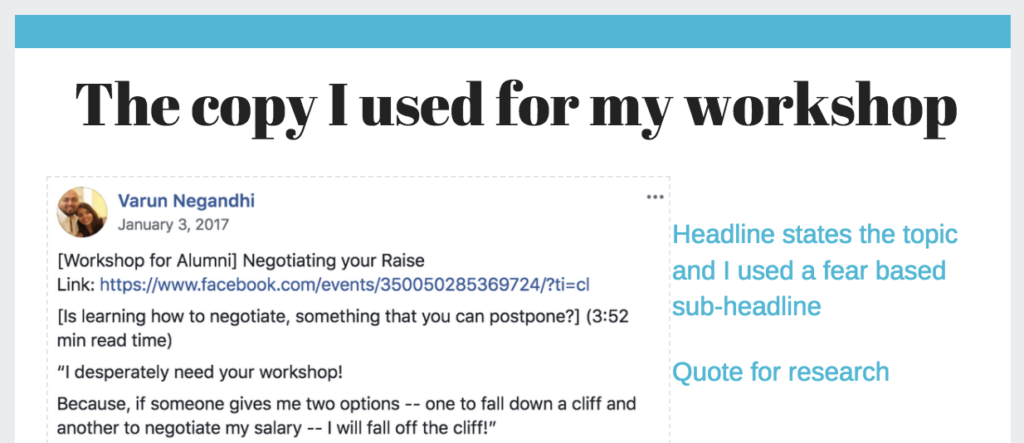
Benchmark: Spend 2 to 4 hours on market research.
Once you complete writing your announcement, make the copy great by adding subtle elements unique to your sub-niche, like:
- Inside jokes. Differentiate yourself from dull and boring workshops.
- Stories and quotes specific to your niche.

Benchmark: Spend 30 minutes adding final touches to your copy.
Two extra steps to make your workshop a super-hit
Make it easy for your partner organization to promote your workshop
To get help from the organization, we will use the “Do It For Them” principle.
You can use the following script to send an email to your contact.
Hello <insert name>,
How are you doing? I am excited to share that <insert number of interested people> have signed up for the workshop.
It is my mission to add value to as many people as I can. In that spirit, are you open to sharing the workshop link on the company’s social media accounts and email list?
I am sure that you are busy with your work so I have pre-written two pieces of copy. A piece of short copy (for social media) and long copy (for email). Feel free to edit them.
—
Short copy.
Do you want to <insert #1 benefit of the workshop>? Attend the <workshop name> we are hosting at <insert workshop details>: <insert link>
Long copy.
<insert copy you wrote for the workshop>
Send a reminder message to your invitees a day before the workshop
In the first workshop I hosted, a friend of mine had signed up and even discussed the topics with me. On the day of the workshop, he was a no-show. The next time I met him, I asked, “Hey, where were you the other day?”
He said, “F**k! I completely forgot about it.”
I could be angry with him but I realized it was my mistake. I hadn’t reminded my audience. It is always better to send your audience a reminder and to inspire them one last time to take action.
Hello, this is <insert your name> and I wanted to send a gentle reminder about tomorrow’s workshop. The <insert workshop name>.
I know you have competing options tomorrow. The option to stay home and relax with your family, and to catch up on your favorite show. I get it, we all need a break from time to time.
So, let me give you a challenge. Do you remember what you did the last 4 Saturdays? Think about it.
Mostly not. Now, can you remember the last time you took action that made an impactful difference to your life?
Yes!
I have the utmost respect for the time that you are giving me so I will make sure that it is valued. Here are the <insert top two benefits> I promise to deliver.
See you tomorrow,
Step 3. Get maximum insights for your business
Your primary goal of hosting a workshop is to gather data that helps you validate your idea. If you don’t capture insights for your business, the work that you have done will lose its purpose. So here’s how you can maximize the learning for your business while you provide great value to your audience.
Use index cards to get valuable answers from your entire audience
Using index cards, you can ask your audience questions and they can write their answers anonymously on the index card. These were a game changer for me.
Since the answers are anonymous, the audience will share their heart with you.
So, what questions can you ask?
Start of the workshop
When your audience is in the door, it is the best time to ask them about their motivations.
You can ask about pain points, fears, obstacles, and dreams. Here are some sample questions:
- What is the #1 pain point you are hoping to get solved from today’s workshop?
- What is the #1 thing you say you want to work on, but you haven’t?
- If your #1 pain point gets solved, how would it feel?
- If you had a magic wand to turn your life into your ultimate dream life, what would it look like?
- If you could do <insert workshop benefit>, how will it enable you to live your dream lifestyle?
- What is stopping you from <insert workshop benefit>? Go beyond the common barriers of time and money?
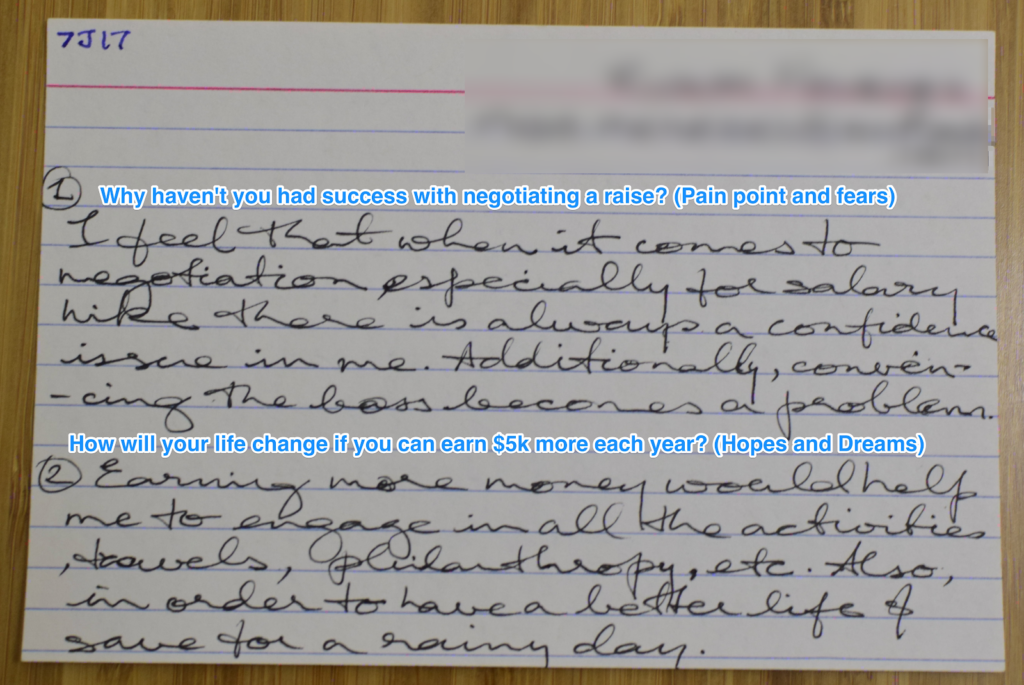
End of the workshop
At the end of the event, you can ask them for their favorite insights, conduct a price test, and ask for their email address.
Here are some sample questions to get main insights from your audience:
- What was your #1 insight from the workshop?
- Which section of the workshop gave you the most confidence to achieve your dream? Why?
- What is the #1 thing you want to implement in your life from today’s workshop?
These insights are valuable, especially for your first workshop. The feedback can help you narrow down the topics for the next workshops.
Run a price test
Hands down, the best validation for your business is money exchanging hands. If you can’t do that yet, the next best validation is a price test.
I ran the price test to understand how my audience values the information. And, if there any sensitivities between different topics and different sub-niches.
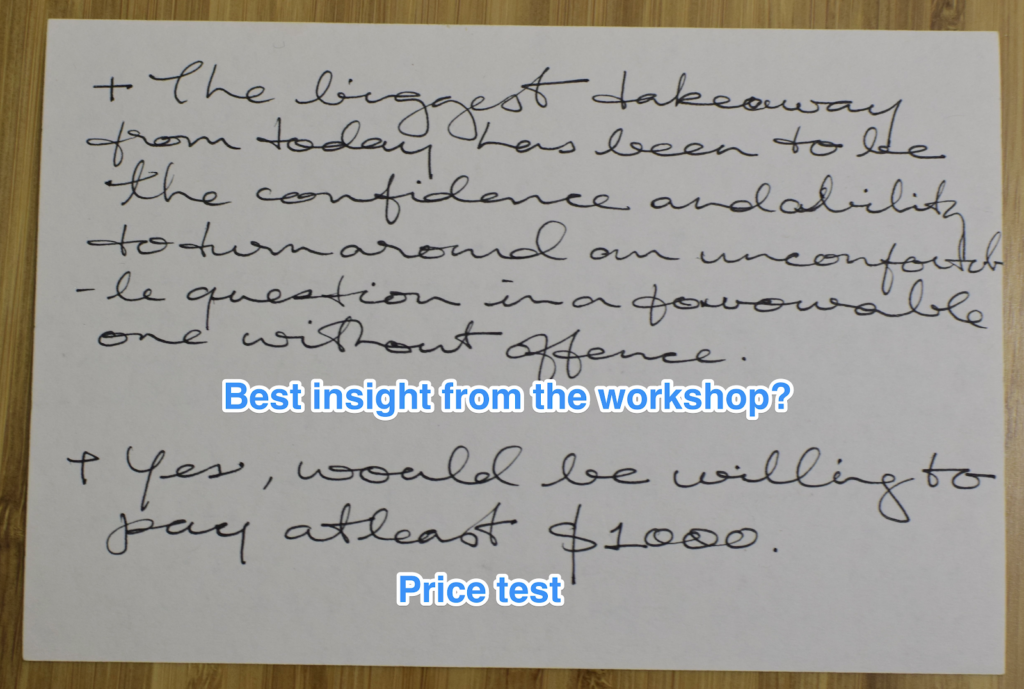
Here’s a simple script to run the price test. Feel free to experiment with it. We will use the information in the final step.
You: Knowing what you know now, would you pay for the systems and mindsets you received today?
Them: Yes
You: If yes, how much?
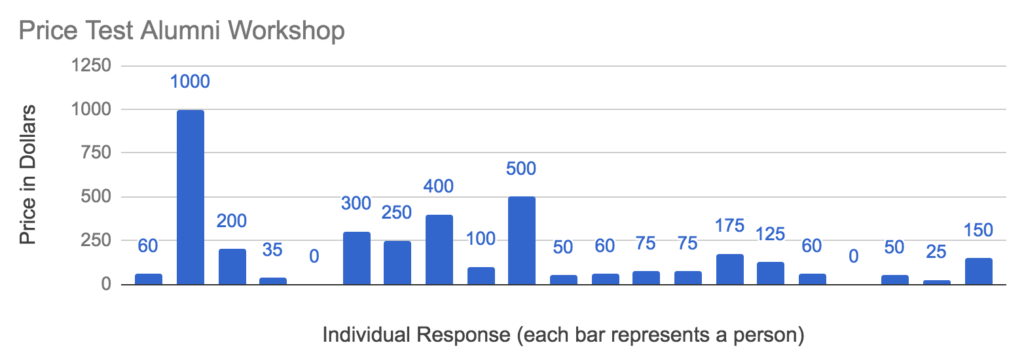
Get their email address for your website
I have one regret from all the workshops I hosted. I never took the audience’s permission to add their email to my email list. Why do I regret it? Because email subscribers are the biggest asset for an online business.
So how can you ask for your audience’s emails?
You: If you want the content from today’s workshop, please write down your best email address. The email address, like your comments on the index card, is 100% confidential.
Once they have written down their email (100% of my audience did):
You: If I start a website to write about these topics would you want me to add you to the website’s email list? You will get any future guides I publish for free, plus you will get first access to our products. If you want this inside access, write “Yes” next to your email id.
0% of my audience said “yes” because I FORGOT TO ASK. Based on the number of people who attended my workshop, I could have started with an email list of 94 people!
(While writing this post I realized my mistake and sent a direct email to my workshop attendees. 69 people opened the email and 40 subscribed. Even though it has been more than a year since the last workshop.)
Send survey questions post-workshop
An extra step to improve your research is to send a post-workshop survey. I have used SurveyMonkey and Typeform in the past, and both are great.
A survey helps you ask multiple-choice questions. Also, if you want detailed answers, then surveys are better than index cards. Here are some sample questions you can ask in the survey:
- Checkbox question: Which of these topics would you like me to cover in more depth?
- What are the takeaways that you find yourself thinking about the most, and why?
- How would you rate me as a presenter?
Each of these types of questions can be valuable for your validation. For example, the checkbox question helped me decide the topic for my next workshops.
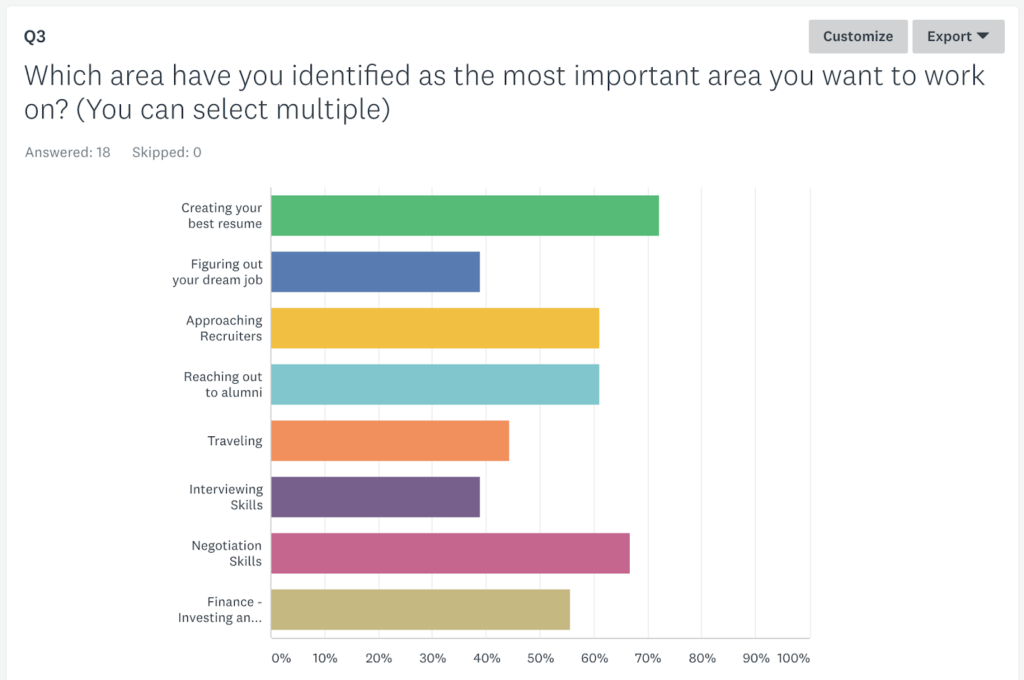
The takeaway question helped me get detailed nuggets after all my workshops.
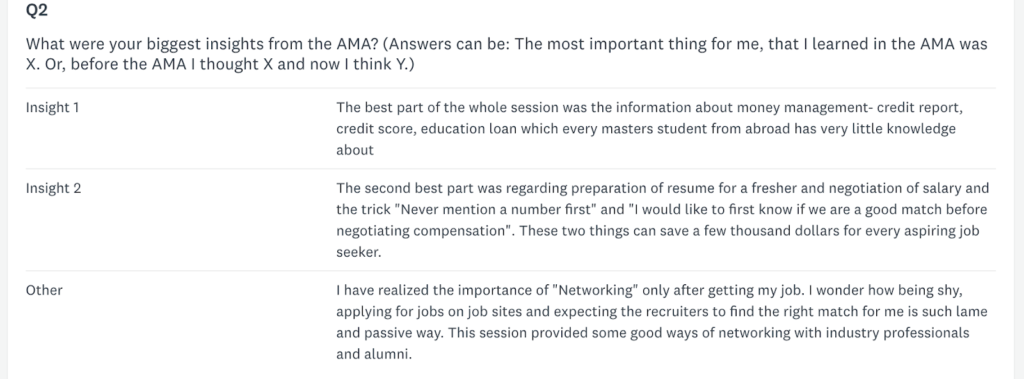
Asking my audience to rate me helped me become a better speaker. I was also able to use the great review as social proof for the next workshops.
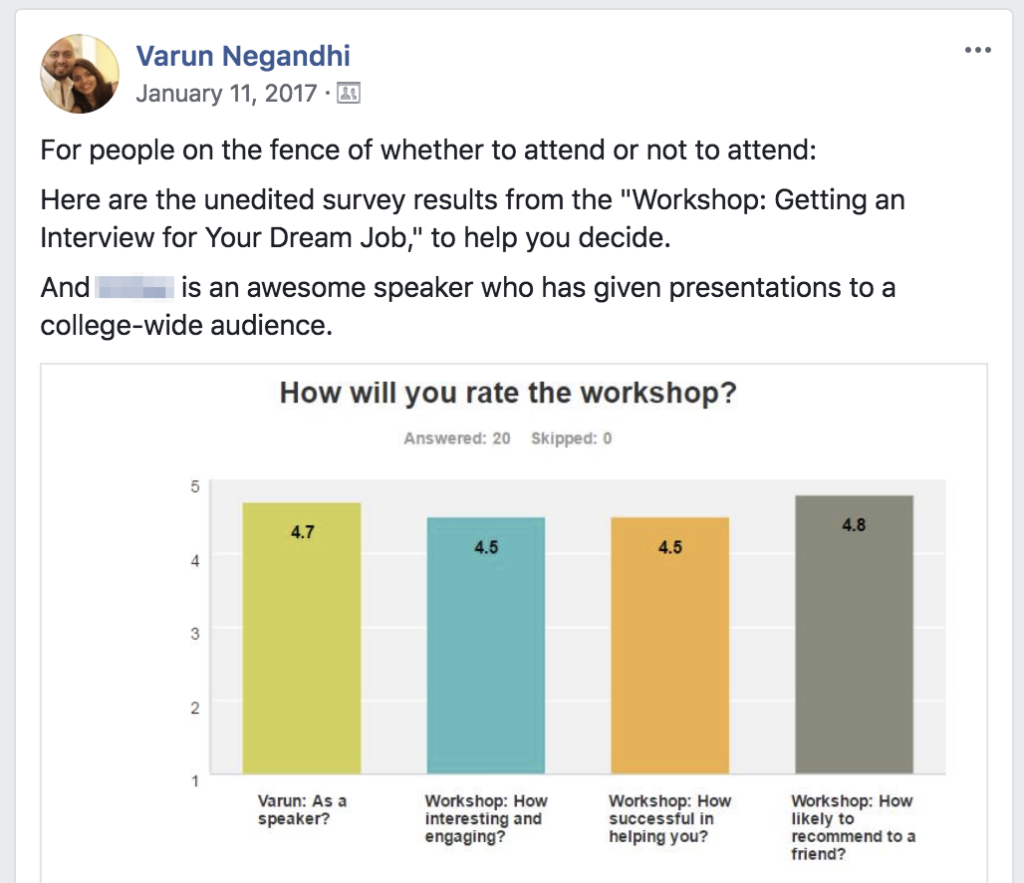
Host more workshops
Beyond Grad, the online business I started, was a result of four workshops attended by 94 people in total.
I wouldn’t have validated my business based on the first AMA. So host more workshops based on the topics the audience liked, or a topic you didn’t cover in the workshop. You can also experiment with a different sub-niche and workshop style.
How many more should you do? There is no exact science to help us with this question. Host as many workshops as it takes to validate your business.
Workshops = validation?
At this point, you will already have a gut feeling about whether your idea is well received or not. To confirm that you have a validated idea, it requires two things:
- People interested in your idea
- People willing to pay for your idea
By using the qualitative and quantitative data from the workshop, if you are able to say “yes” to both these things, then you have a validated idea!
In addition to a validated idea, you have a bank of information to launch your website and business. You start with a list of email subscribers. You can grow this list by creating content from the qualitative research data. You can even use the results from the price test to create products and start monetizing.
Before the workshops, I spent three years spinning around in my head with nothing to show for it. I feared I was turning into a wantrepreneur. Just like it was for me, workshops will give you the confidence that, “Yes, people desperately want what I have to share.” And you will start with a strong foundation that would have taken months (or years) otherwise.



